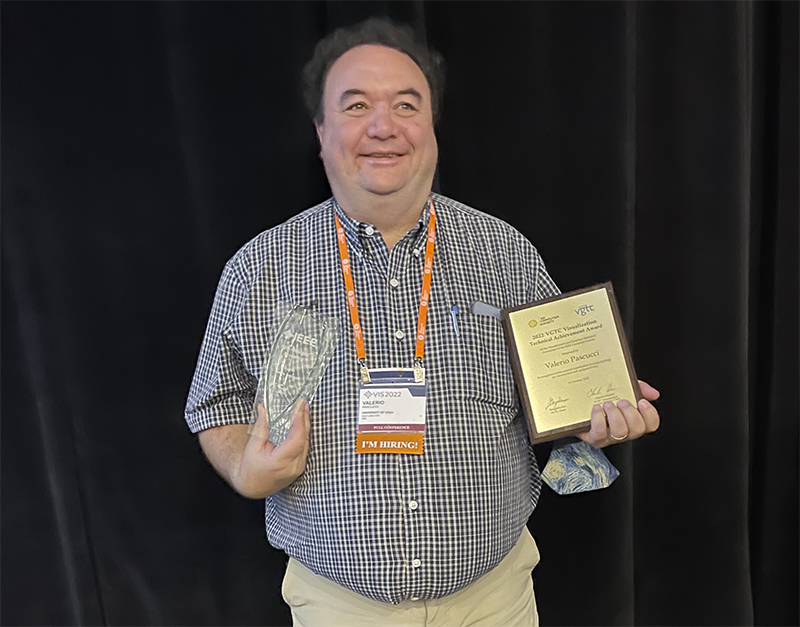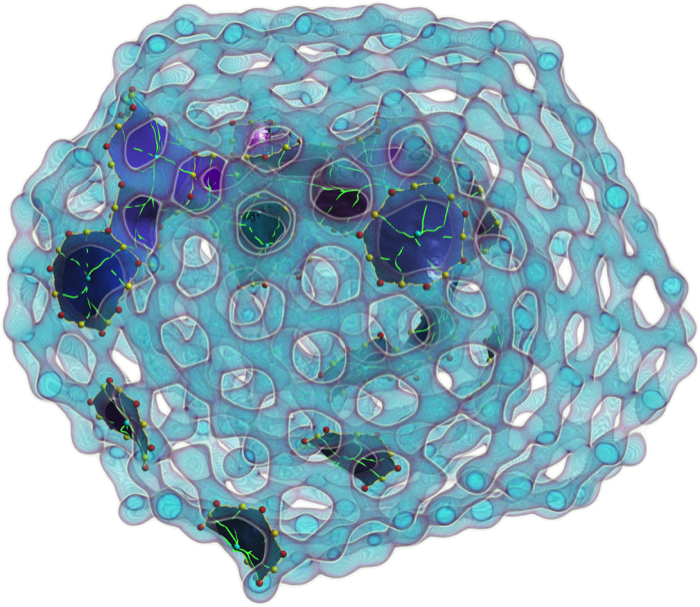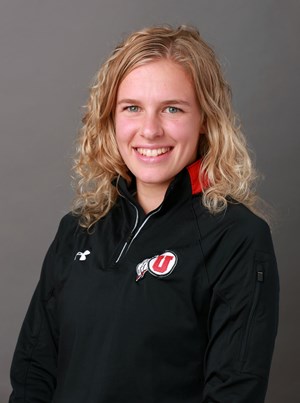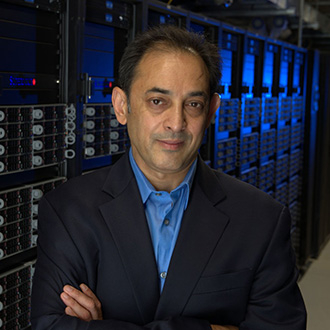SCI Faculty Make Headlines at Vis 2022

Congratulations are in order for several SCI faculty who took to the awards stage at the IEEE Visualization conference this year in Oklahoma City. Valerio Pascucci was not only awarded the IEEE VGTC Visualization Technical Achievement Award, but was also inducted into the IEEE Visualization Academy. The Visualization Academy is a prestigious academy that highlights the accomplishments of the leaders in the field. These awards are limited in number, and recognize those in the field who exceed or augment the criteria of existing VGTC awards. Furthermore, Valerio, along with co-authors Atilla Gyulassy, Peer-Timo Bremer, and Bernd Hamann received the Scientific Visualization 14 year Test of Time Award for the paper: A practical approach to Morse-Smale complex computation: Scalability and generality.
Valerio Pascucci Receives IEEE VGTC Technical Achievement Award
 The 2022 VGTC Visualization Technical Achievement Award goes to Valerio Pascucci for his seminal contribution in using topology for visualization and analysis of data.
The 2022 VGTC Visualization Technical Achievement Award goes to Valerio Pascucci for his seminal contribution in using topology for visualization and analysis of data. Valerio Pascucci is the John R. Parks Inaugural Endowed Chair of the University of Utah, a Professor of Computer Science in the School of Computing, a faculty member of the Scientific Computing and Imaging Institute, and the Founding Director of the Center for Extreme Data Management Analysis and Visualization (CEDMAV) at the University of Utah. He received a Ph.D. in computer science from Purdue University after moving from Italy to the US. Valerio’s Ph.D. research was titled “Multi-dimensional and multi-resolution geometric data-structures for scientific visualization” and investigated the effective use of visualization techniques to enable the interactive, intuitive exploration of big scientific data.
Ab Initio Visualization for Innovative Science
This project aims to establish a theoretical framework to design scientific experiments starting with the visualization of the results (in this case, visualization of data represented as images) and working backwards to optimize experimental parameters to drastically increase information gain and decrease costs. The goal of this work is to use photo-realistic, model-based, synthetic visualization to enable a drastic leap forward for image-based experiments of complex or extreme events. The combination of optimal experimental design theory and post-optimality sensitivity analysis will be used to maximize scientific discovery in service of decision-making. Post-optimality sensitivity analysis will also elucidate model inadequacies and sources of bias by probing the discrepancies between the ab initio visualization (expected or speculative results) and the actual results of the experiment, in addition to guiding analysts to the most important features responsible for the phenomena observed in the visualization.
Three New Paper Awards
Jadie Adams, Nawazish Khan, Alan Morris, Shireen Y. Elhabian. Spatiotemporal Cardiac Statistical Shape Modeling: A Data-Driven Approach. The 13th International Workshop on The Statistical Atlases and Computational Modeling of the Heart (STACOM) - MICCAI, 2022, won the “Best Oral Presentation Award.”
Daniel Klötzl, Tim Krake, Youjia Zhou, Ingrid Hotz, Bei Wang, Daniel Weiskopf. Local Bilinear Computation of Jacobi Sets.
Computer Graphics International (CGI), 2022, won the "Second Best Paper Award."
Surojit Saha, Ouk Choi, Ross Whitaker. Few-Shot Segmentation of Microscopy Images Using Gaussian Process. "Best Paper" at 1st International Workshop on Medical Optical Imaging and Virtual Microscopy Image Analysis.
New oneAPI Center of Excellence at University of Utah with Lawrence Livermore National Laboratory
The oneAPI Center will build a portable, scalable, performant ZFP backend using oneAPI and SYCL to advance exascale computing
 |
| Manycore and multicore architectures with large memory help with a wide variety of analyses, such as Morse-Smale decomposition to understand ion diffusion characteristics of simulated battery anode materials. |
Six New Projects Funded
Anna Busatto receives Pac-12 Scholarship
 Anna Busatto has been named a recipient of the 2022 Pac-12 Postgraduate Scholarship.
Anna Busatto has been named a recipient of the 2022 Pac-12 Postgraduate Scholarship.The scholarship is worth $9,000 and annually recognizes up to two student-athletes from each Pac-12 school. Established in 1999, the award honors and financially assists some of the Conference's most outstanding athletes and scholars as they continue their educations and prepare for careers in their chosen industries. Across the Pac-12, scholarship recipients maintained a minimum 3.0 grade-point average and demonstrated a commitment to education, campus and community involvement, and leadership.
SCI Welcomes Five New Faculty to the Institute
Bei Wang Receives U SEED2SOIL Grant
 SEED2SOIL: Telematic Data for Fleet Vehicles: A Data-Driven Solution Towards Optimal Fleet Management and Clean Vehicle Adoption
SEED2SOIL: Telematic Data for Fleet Vehicles: A Data-Driven Solution Towards Optimal Fleet Management and Clean Vehicle Adoption
Assessing the performance of fleet services has long been an important yet challenging issue for public agencies and researchers. Performance evaluation can help the campus facilities division identify underperforming services, plan for potential investments, justify the previous investments, consolidate across multiple services, and communicate accomplishments and challenges. The goal of this study is to use telematics data to analyze the performance of the fleet operation systems and develop strategic solutions for effective fleet service management. The team will utilize a combination of Geographical Information System (GIS), data science, and visualization methods to identify the underutilized fleet and service coverage gaps, and inform strategic decision-making related to consolidated services and zero-emission vehicle deployment. This will be a joint project between PI Xiaoyue Cathy Liu at the Civil And Environmental Engineering and Co-PI Bei Wang Phillips from the SCI Institute. Through the SEED2SOIL program (https://attheu.utah.edu/facultystaff/sustainability-research-grants/), researchers use the University of Utah Campus as a Living Lab to improve campus operations and contribute to broader sustainability knowledge.
Parashar Named Presidential Professor
 School of Computing professor Manish Parashar, who is the director of the University of Utah’s Scientific Computing and Imaging Institute, was recently named Presidential Professor.
School of Computing professor Manish Parashar, who is the director of the University of Utah’s Scientific Computing and Imaging Institute, was recently named Presidential Professor.The title of Presidential Professor is reserved for those with achievements that “exemplify the highest goals of scholarship as demonstrated by recognition accorded to them from peers with national and international stature and whose record includes evidence of a high dedication to teaching.”
